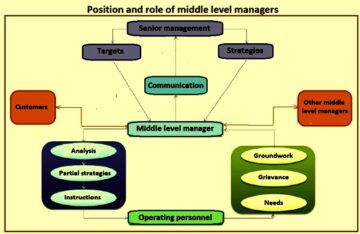The Critical Role Of Middle Managers In Organizational Effectiveness

Table of Contents
Bridging the Gap: Communication and Information Flow
Middle managers act as a critical bridge in the communication chain, facilitating the flow of information between upper management and frontline employees. They translate complex strategic directives into actionable tasks, ensuring everyone understands their roles and responsibilities. However, effective communication presents significant challenges for middle managers.
- Information Overload: Middle managers often juggle multiple priorities and receive information from various sources, leading to potential overload and miscommunication.
- Conflicting Directives: Inconsistent or contradictory messages from upper management can create confusion and hinder progress.
- Lack of Transparency from Upper Management: A lack of transparency can lead to distrust and hinder open communication.
- Difficulty Communicating Complex Information to Diverse Teams: Effectively conveying complex information to teams with varying levels of understanding and expertise requires strong communication skills.
To improve communication, organizations should implement best practices such as:
- Regular Team Meetings: Facilitate open dialogue and information sharing.
- Transparent Communication Channels: Ensure clear and accessible channels for communication in both directions.
- Active Listening: Encourage middle managers to actively listen to their teams' concerns and feedback.
- Clear and Concise Messaging: Promote clear, concise communication to avoid confusion and misinterpretations.
- Providing Constructive Feedback: Establish mechanisms for regular feedback to improve communication and performance.
Effective communication strategies, robust information flow, and strong organizational communication are paramount to success.
Driving Performance and Team Motivation: Leading and Coaching
Middle managers play an essential role in motivating and mentoring their teams, fostering a positive work environment that drives performance and productivity. Their leadership style significantly impacts team morale and overall effectiveness. Effective middle managers employ various techniques:
- Mentorship: Providing guidance and support to team members.
- Delegation: Assigning tasks effectively to leverage team strengths.
- Empowering Employees: Giving team members autonomy and ownership over their work.
- Recognizing Achievements: Acknowledging and celebrating team successes.
- Providing Constructive Criticism: Offering feedback that helps team members improve.
- Fostering a Positive Work Environment: Creating a supportive and collaborative atmosphere.
By setting clear goals and expectations, providing necessary training and development, monitoring progress, addressing performance issues promptly, and promoting collaboration, middle managers contribute significantly to improved team performance and productivity. Strong team leadership, employee motivation, and effective performance management are key elements of their success.
Strategy Implementation and Operational Efficiency: Execution and Accountability
Middle managers are vital in translating high-level strategies into actionable plans for their teams. They ensure operational efficiency and that organizational objectives are met. This involves:
- Resource Allocation: Effectively managing resources to support team goals.
- Project Management: Planning, organizing, and executing projects within set deadlines and budgets.
- Problem-Solving: Identifying and resolving issues that hinder progress.
- Decision-Making: Making timely and informed decisions to keep projects on track.
- Monitoring Performance Metrics: Tracking key indicators to measure progress and identify areas for improvement.
- Reporting Progress to Upper Management: Keeping upper management informed on project status and performance.
Accountability is crucial. Middle managers must track progress toward goals and ensure their teams are meeting expectations. Effective strategy execution, operational excellence, and results-oriented leadership are key competencies for middle managers in this area.
Fostering Innovation and Adaptability: Embracing Change
Middle managers play a critical role in fostering a culture of innovation and adaptability within their teams. They need to encourage creativity and experimentation, while also managing risk and adapting to changing business environments. This includes:
- Identifying Opportunities for Improvement: Encouraging team members to identify areas where processes can be improved.
- Promoting Creative Thinking: Creating a safe space for team members to share ideas and experiment with new approaches.
- Embracing New Technologies: Encouraging the adoption of new technologies to improve efficiency and effectiveness.
- Adapting to Change: Guiding their teams through organizational changes and transitions.
- Managing Risk: Assessing and mitigating risks associated with new initiatives and changes.
By embracing change management, promoting innovation management, and fostering organizational agility, middle managers ensure their teams remain competitive and responsive to market demands. Continuous improvement should be a core value.
Unlocking Organizational Potential Through Effective Middle Management
In conclusion, the critical role of middle managers in organizational effectiveness cannot be overstated. They are essential for effective communication, team motivation, strategy execution, and fostering innovation. Investing in the development and support of middle managers—providing training in leadership, communication, and change management—is essential for unlocking the full potential of any organization. Invest in your middle managers and unlock the full potential of your organization. Develop a robust strategy for improving the critical role of middle managers in your company today!

Featured Posts
-
 Fan Casting Frenzy Why Henry Cavill Is The Perfect Wolverine For World War Hulk
May 11, 2025
Fan Casting Frenzy Why Henry Cavill Is The Perfect Wolverine For World War Hulk
May 11, 2025 -
 Lily Collins Sizzling New Calvin Klein Campaign Photos
May 11, 2025
Lily Collins Sizzling New Calvin Klein Campaign Photos
May 11, 2025 -
 Find Local Obituaries Stoke On Trent And North Staffordshire
May 11, 2025
Find Local Obituaries Stoke On Trent And North Staffordshire
May 11, 2025 -
 Two Celtics Players Shatter Expectations With 40 Point Games
May 11, 2025
Two Celtics Players Shatter Expectations With 40 Point Games
May 11, 2025 -
 Celebrity Homes On Mtv Cribs A Visual Tour Of Lavish Properties
May 11, 2025
Celebrity Homes On Mtv Cribs A Visual Tour Of Lavish Properties
May 11, 2025
